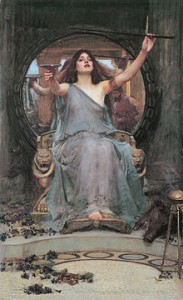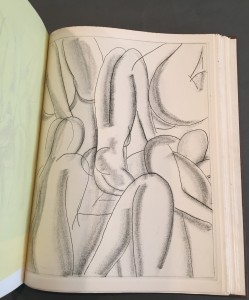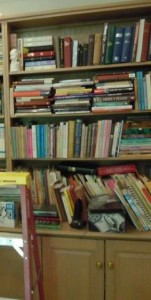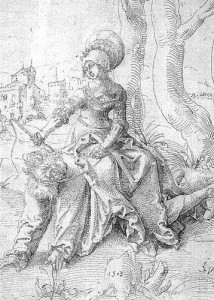ULYSSES readalong: Bk 15 part 2, “Circe”
Tuesday, May 12th, 2015
Welcome back, you few, you happy few, who are still brave enough to continue with Joyce’s oh-so-challenging Ulysses. This week finds us in the mucky middle of book 15, Circe. Oh, what a long, strange trip it is.
I picked the section that begins with Zoe saying “Talk away till you’re black in the face,” which is an interesting twist on the “blue” we’re more accustomed to. Blue indicates lack of oxygen, while black points to death. Bloom has a short interlude of lucidity with Zoe, but he goes in and out of fantasy. I could tell what was fantasy and what not mostly but not always by when the “real” people in the room spoke, rather than the objects, such as Lynch’s cap, Zoe’s buckles and Bella’s fan; or imaginary people, such as Virag (Bloom’s grandfather), and others.
An extended and jaw-dropping (and likely censor-enraging) dream sequence begins when the madame, Bella Cohen enters and says “My word, I’m all of a mucksweat.” Everything from there till when she asks “Which of you was playing the dead march from Saul?” is Bloom’s imagination, his subconscious and secret thoughts dragged out of the dark and brought to life.
To briefly summarize, Bloom and Bella switch roles. She becomes a man named Bello, he a woman referred to still as Bloom but with feminine pronouns. Bello, like Circe did to Odysseus’ men, makes Bloom piglike and alludes to many porcine things. In an inversion of the play Venus in Furs by Leopold von Sacher-Masoch, many of the things Bello as a man does to Bloom as a woman echo those that Wanda does to Severin. I was fortunate to see a modern retelling, Venus in Fur, a few years ago, so I recognize the references.
Bello rides Bloom as a horse, which the other prostitutes clamor to do also. Bello puts out a lit cigar on her ear, and auctions her off to other men, after this: “[Bello] bares his arm and plunges it elbowdeep in Bloom’s vulva.”
For the record, Joyce got his words mixed up. Vulva refers to all of woman’s external genitalia such as the labiae and the clitoris, south of the pubic bone. North of it, with the hair, is the mons. The reproductive canal is the vagina, which is what Bello plunges his arm into up to the elbow. This is not, as schmoop notes in its summary of 15: Circe, the same as “Bello elbows Bloom in the vulva.”
The above terminology, and the importance of using it correctly, is from one of my new favorite books, which I’ve found not surprisingly often relevant to this reading of Ulysses, Come As You Are: The Surprising New Science That Will Transform Your Sex Life by Emily Nagoski. The subtitle of the book is probably more for getting attention. I find the website’s description a better one: “An essential exploration of why and how women’s sexuality works–based on groundbreaking research and brain science.” Poldy and Molly could really have used this book. So could Joyce. Here’s Matisse’s take on the anatomy in Chapter 15, Circe:

Back to Ulysses. Bloom gradually returns to a state of masculinity and Bello to Bella. Reality is again broached when Bella asks about the piano.
You can visit the summary at Schmoop.com and the analysis if that helps. Again, they’re not precise, but I do find them broadly helpful.
Did anyone else see Venus in Fur when it was in Minneapolis? Excerpt video here, and review here.
What did you think of this part of chapter 15?
Let’s meet here next Monday 5/18/15 to discuss the last part of chapter 15, and the chapter as a whole.
Apologies for this week’s late post. I visited my parents this weekend with my sister to help them clear out the house while they’re still alive and well, which I wrote about here. I highly recommend doing this, both getting together with the nuclear family, and going through things before one has to. We’ve all been influenced by one of my other recent favorite books, Marie Kondo’s The Life-Changing Magic of Tidying Up. Too see a video where she helps a woman sort her books, go to this link at Boing Boing.
Blogging about it on Monday was perhaps an ambitious goal. I’ll adjust the schedule to Wednesday, I think, when we read David Foster Wallace’s Infinite Jest this summer.
Future schedule and past posts:
5/18/15 discuss and tweet 3475-end, and all of section 15
5/25/15 discuss and tweet section 16
(extra week to read the longer section 17)
6/8/15 read then discuss and tweet section 17
6/15/15 discuss and tweet section 18
6/16/15 Bloomsday!
Past posts:
Week 1: books 1 and 2
Week 2: books 3 and 4
Week 3: books 5, 6
Week 4: book 7
Week 5: book 8
Week 6: book 9
Week 7: book 10
Week 8: book 11
Week 9: book 12
Week 10: book 13
Week 11: book 14
Week 12: book 15 part 1/3


